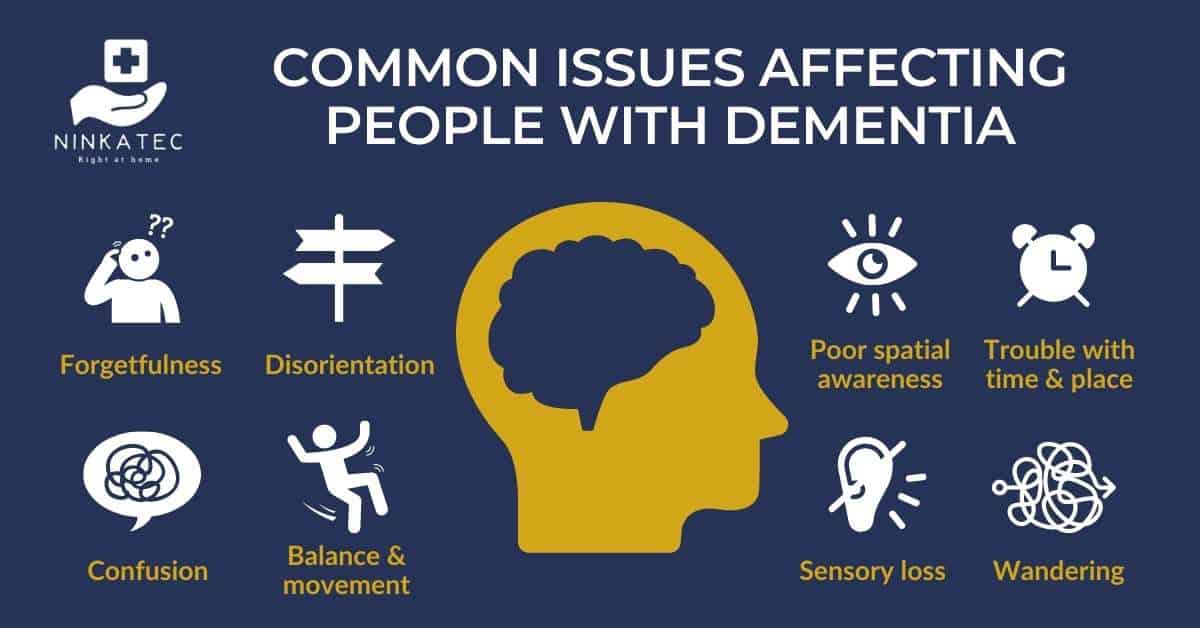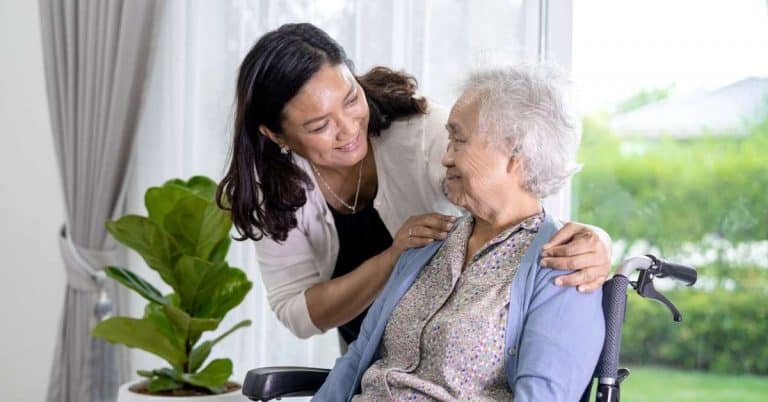Alzheimer’s disease and dementia are commonly associated with memory loss. But forgetting what happened the day before is not the only problem people with the disease have to manage. With the decline of cognitive and memory function comes a multitude of challenges, affecting all aspects of life, including daily activities, social interaction, and personal safety.
In this article, we discuss some of the common challenges affecting the safety of those diagnosed with dementia and cared for at home. Read on to learn about the measures, tools, and aids that family caregivers can use to manage these issues and keep your loved ones safe.
Table of Contents
1. Common challenges caused by Dementia
Dementia typically progresses through 7 stages, but its symptoms and progression differ from individual to individual. The way it affects each person is unique, depending on the type of dementia one has, the cognitive baseline level before dementia, other existing medical conditions - i.e., comorbidities, and overall physical health, among other factors. Specialised and personalised care is often required, especially in the advanced stage of dementia.
However, there are common issues people with dementia and their families often have to deal with. They stem from the impairment of memory and cognitive function - a key characteristic of dementia. Here are the typical challenges caused by dementia:
- Loss of memory function - from forgetting appointments and tasks in the early stages, to neglecting eating, drinking and personal hygiene in late stages.
- Cognitive decline, manifesting as poor judgement and loss of the ability to reason and think clearly.
- Confusion - difficulty recognising people or differentiating items.
- Disorientation - having trouble recognising where one is, this can lead to wandering.
- Trouble with balance and movement, which means an increased risk of tripping and falling.
- Difficulty with spatial awareness, i.e., challenges with estimating distances, which can lead to problems when parking a car, using the stairs, grabbing items, etc.
- Trouble with sense of time and places, which can lead to sleeping issues, sundowning syndromes, confusion and anxiety.
- Sensory loss, such as visual, hearing or smelling problems. Visual and hearing issues can pose danger to seniors when they are out of their home.
- Wandering, getting lost and not being able to find their way home.
- Not recognising family members, friends and places.
- Loss of appetite.
We discuss each of the issues and suggest some of the strategies and tools to deal with them below.

People with dementia face a multitude of daily challenges, caused by forgetfulness, confusion, disorientation, wandering, difficulty with balance, movement and spatial awareness, sensory loss, and trouble with time & place.
2. Forgetfulness
Memory loss is one of the hallmarks of dementia. The disease typically affects short term and working memory first. The person may not remember what has just been said and ask repeated questions. Over time, long term memory will be affected, such as general knowledge and information or memories from a distant part. The person may forget a loved one’s name, how to brush their teeth, or why brushing teeth is necessary.
Memory deterioration can result in a lot of safety issues. In the mild phases, people with Alzheimer’s disease and dementia may forget important doctor’s appointments or take medications at the wrong time. As the condition worsens, they may forget how to operate a microwave oven, or touch a stove or a hot water jug when it is in use. This can be not only frustrating for the persons with dementia, but also worrisome for their caregivers and families.
To keep your home safe, ensure that your home has safety switches and that all electrical appliances have automatic switch-off function and do not pose other safety hazards. Smoke detectors and fire detectors are essential, in case something catches fire. You can also pre-program appliances and put a clear, easy-to-see reminder or instruction next to them. For instance, pre-set the menu of the microwave oven so your senior loved one only needs to press one button, and clearly indicate which button that is. However, avoid crowding the kitchen countertop or dining table, as busy arrangements can further confuse someone with dementia (more about that in the section on ‘Confusion’ below). You should also keep sharp and breakable utensils.
To manage forgetfulness associated with dementia, memory aids or labels such as dementia reminder board, sticky notes, calendars or diaries, phone reminders, notebooks, and phone books can be utilised. A phone reminder function can be set up if the individual is able to use a phone, while a notebook or phone book can be used to keep track of important phone numbers and other information. However, it is important that the person with dementia habitually uses these dementia aids, as they will not be effective if they are not used consistently.
3. Disorientation, wandering and getting lost
Disorientation, or difficulty recognising where one is, is a common problem for persons with dementia. It can lead to wandering and pose a significant safety risk. For instance, they may navigate into unfamiliar surroundings and cannot find their way back home, or they may wander into traffic or dangerous situations. This can result in anxiety, a sense of loss of control, and stress for both the person and their caregivers.
The following dementia aids and strategies may help if your dementia loved one is prone to wandering and getting lost:
- Location tracking devices: These devices can be attached to clothing or worn on the wrist to assist the persons to find their way back if they become lost. Their family members can also find out where they are and help them get back home.
- Identification card: The identification card should contain important information such as the person’s name, home address, and details of what a stranger should do if they notice the person with dementia is lost or needs help. The identification card should be worn visibly on the neck or as a bracelet.
- Door and window alarms: These alarms can alert caregivers if the person with dementia tries to leave the house and can be a helpful tool in preventing wandering. In modern homes, smart home technology, such as door and window sensors, can perform the same function.
- Handphone: Save important numbers for anyone to contact in case your loved one goes missing.
4. Trouble with balance and movement
Trouble with balance and movement is a common problem for people affected by dementia, which can lead to falls and other accidents. This can be due to several factors, including changes in muscle strength, coordination, gait and balance, as well as spatial awareness and perception issues.
Here are some measures and tools to help manage trouble with balance and movement:
- Environmental changes: Making changes to the environment, such as reducing clutter, increasing lighting, and making sure that floor rugs and mats are securely fastened, can help people with dementia navigate better at home and avoid falls.
- Home improvements: You can also make your home safer by installing handrails in the bathroom, treating uneven and slippery floors and removing other falling and tripping hazards.
- Assistive device and footwear: Assistive devices, such as walkers, canes, and wheelchairs, can help people with dementia maintain their balance and reduce the risk of falls. Ill-fitting footwear can also be the culprit of falls in seniors. Make sure your senior loved one wears shoes and indoor slippers that fit them well, are not slippery and provide good support.
- Exercises: Staying active is an effective way to improve balance, coordination, and muscle strength, all of which are important to prevent falls and other accidents among the elderly. Make sure you help your loved one ensure safety even if they are able to exercise by themselves.
- Physical therapy: Some individuals may benefit from physical therapy to improve balance and coordination. Check with your doctor if it is helpful for you or your loved one.
Check out our article on falling risk among the elderly, including how to get a subsidy when you renovate your home for your senior loved one’s safety here.
5. Poor spatial awareness
Poor spatial awareness refers to difficulty perceiving the distances of objects in one’s surroundings. This can pose significant challenges for the elderly when they navigate stairs, uneven floors, and other obstacles, thus increasing the risk of falls and other accidents. If the senior with dementia can still drive or go out on their own, compromised spatial perception can increase the risk of accidents, such as when they misjudge distances between vehicles or walk in unfamiliar areas with steps or staircases.
If you notice issues with spatial perception in your loved one, it is best to keep their company when they go out. At home, in addition to home safety measures and the use of assistive devices such as walkers and canes mentioned in the above section, consider using sensory cues, such as contrasting colours on the wall or floor to alert the loved one with dementia of changes in the environment. You may also need to examine objects with potential hazards like knives, stovetops, ceramic and glassware, etc and replace them with safe and easy-to-grip items for precaution.
6. Confusion
Confusion is a common problem in people with Alzheimer’s disease and dementia. They may confuse similar objects, such as a jar and a glass of water. Light switches that are similar in colour with the wall may be difficult for someone with dementia to identify. A house with a lot of closed doors that look the same may cause confusion of where to go and what to do next. This can lead to difficulties in managing daily activities and increase the risk of accidents or other safety concerns.
Here are a few suggestions and dementia aids that can help manage confusion:
- Colour coding: Using colours is an effective way to make objects stand out and easy to find. For instance, painting or putting coloured stickers around a light switch can help your loved one locate it more easily and reduce confusion.
- Label objects: Labelling objects with clear and concise descriptions can help people with dementia understand what each object is and reduce confusion. For instance, it can be helpful to label each wardrobe door to help them find the right clothes, or put clear labels on the switches for bathroom light and water heater that are next to each other outside the bathroom door to avoid confusion.
- Leave doors open when possible: Closed doors that look similar can confuse someone with dementia. Leave doors leading to the kitchen or dining room open if possible. It will give seniors the clue that behind the door is the kitchen and prevent them going around looking for it.
- Removing choices when they are not necessary. For example, if your loved one can be easily confused, you may want to serve a meal dish by dish, or try putting one glass of water in front of the person on the dining table, instead of a glass and a jar.
- Reminders: Using reminders, such as a whiteboard or sticky notes, can help the person remember what objects are for and reduce confusion.
- Familiarity and routine: Providing a dementia loved one with familiar objects and surroundings and establishing a routine with clear, consistent instructions can help mitigate confusion and increase their sense of security, stability and comfort. More about the role of routines and familiarity in dementia care below.
- Family: Nothing is scarier for a dementia patient than being alone i.e., when there is no one to talk to when they feel confused. Being surrounded with people who are familiar and who understand them and are always there to help them makes a huge difference.
7. Sensory loss
Sensory loss, including loss of smell, vision, and hearing, can be a significant problem for dementia patients. This loss can impact their daily activities, social interactions, and overall quality of life.
In people without dementia, vision and hearing loss can be compensated by the brain to some extent. However, this is unlikely for people with dementia. If left undetected and unmanaged, sensory loss may worsen rapidly and intervention such as hearing aids or glasses may only have limited effect.
To deal with sensory loss among people with dementia, early detection is crucial. Go for regular health screenings to identify any hearing, vision issue or risk. At early stages, you can benefit from assistive devices, such as:
- Assistive devices for hearing: Hearing aids, amplified telephones, and alert systems can help those with hearing loss manage their condition.
- Tools and devices to help with vision: Devices such as magnifying glasses, large-print books, and adjustable lighting can help.
- Adaptive clothing: Clothing with bright colours, bold patterns, and easy-to-use closures can help people with impaired vision identify their clothing and manage their condition.
8. The importance of routines and familiarity in dementia care
Behaviour changes caused by Alzheimer’s disease and dementia require coping strategies and tools. Yet too many changes may disrupt a person’s habit, increasing confusion and distress. Therefore, the dementia strategies and tools we discussed above need to be introduced gradually and complementary to the person’s habits. The tools and aids only work if your loved ones use them.
The changes and tools you implement to keep your loved ones safe may not work instantly either. It takes time to establish a habit. And habit and consistency is what people with dementia thrive on. In fact, research shows that persons with dementia perform better with routines and familiarity. A familiar environment, such as at home, and routine daily activities help them retain a sense of control and accomplishment, and mitigate forgetfulness, confusion and the risk of accidents.
As a caregiver, it is important to take note of your loved one’s existing habits and preferences in their activities of daily living (ADL’s). If they tend to forget taking their morning medication in the morning but have the habit of turning on TV after breakfast, perhaps you can place the medications next to the TV remote. As another example, if they have difficulty recognising their home because the entrance of their home and the neighbour’s home look similar, placing a clear picture of their favourite pet or animal outside the entrance can help to provide a clue. Keen observation and a little creativity goes a long way.
Ultimately, the purpose of dementia coping strategies, tools and aids is to help the persons with dementia take the best care of themselves, for as long as possible, while maintaining their safety and dignity.
9. Takeaway Message
Dementia is a complex and challenging condition that touches multiple aspects of a person’s life. This makes providing care and ensuring safety for a dementia loved one highly challenging for family caregivers. It is not helpful to tell someone with Alzheimer’s disease or dementia just to be careful or try to remember. We need strategies and tools to cope with the unique issues caused by this devastating disease, and we need to weave them into the life of our loved one in the least disruptive way possible.
We hope the article provides you with suggestions and ideas to make your home safe for your dementia loved one. Apply what works for you and share your experience with peers and with us. Though the challenges caused by dementia are unique to each person and family, sharing reminds us that none of us is alone with our challenge. Reach out to us at Ninkatec if you have questions related to dementia care at home, or other useful dementia care ideas to share.








